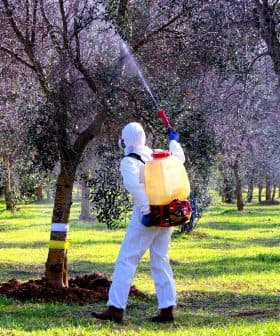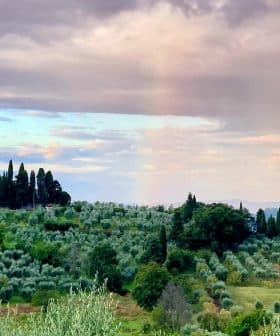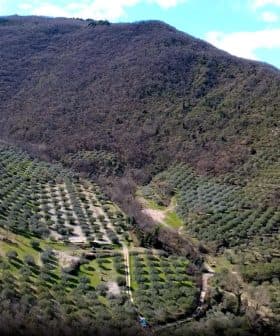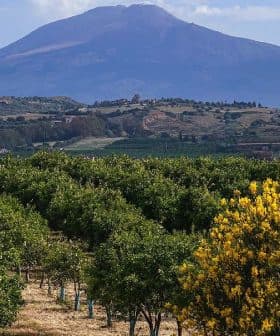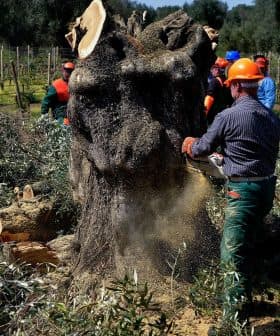Controversy in Italy Over New 'Olio di Roma' PGI
Half of Lazio's olive oil producer's are covered by DOP certifications and say they stand to lose value. The other half can only gain from the new proposed IGP. And some say the bickering among the groups leaves everyone disappointed.
 Lazio, Italy
Lazio, ItalyThe National Olive Growers’ Consortium (CNO) is opposing an application for an IGP Olio di Roma certification in Lazio, arguing that it may devalue existing DOP certifications and harm producers. The CNO is demanding changes to the application, including stricter standards for olive origin and production, before the Ministry of Agriculture passes it along to the EU for approval.
After a bruising battle over the establishment of the ‘IGP Olio di Puglia’, the National Olive Growers’ Consortium (CNO) is gearing up to oppose yet another application for a protected geographic indication (IGP) certification.
This time the showdown is taking place in Lazio, the administrative region which is home to the country’s capital. A public meeting was held at the Temple of Hadrian in Rome last week, at which Unaprol and Op Latium made their case for an IGP Olio di Roma certification and held a public hearing on the matter.
“More than 100 municipalities have already supported this initiative which represents a great opportunity, especially for those provinces and territories that had no chance of having a protected name,” David Granieri, the president of Unaprol, said at the event.
Granieri and his supporters have been lobbying the Ministry of Agriculture for this status for more than two years, which they argue will benefit local producers.
“The recognition of the denomination is a tool for the benefit of companies that adds value and increases their competitiveness,” Granieri said.
Once given the ok by the Ministry of Agriculture, the request moves on to the European Union for a final stamp of approval.
However, Fabrizio Pini, the president of Appo Viterbo and vice president of the CNO warned that the move might actually harm producers if it is rushed to the EU too quickly.
“IGP Olio di Roma could represent a great opportunity for the development of Lazio olive growing,” he said in response to the meeting. “But as it has been thought it risks becoming a boomerang for producers.”
Pini and the CNO believe that blanketing the entire region of Lazio with one IGP certification will eclipse the effects that the already-established protected designation of origin (DOP) certifications already have there.
DOP certifications signify that the quality of a product’s properties are determined by its geographical location and includes both natural and human factors. An IGP certification, on the other hand, indicates that at least one part of the process takes place in the designated area. The latter tends to cover a broader swath of territory than the former.
This slight difference in definition between the two certifications has Pini and the CNO concerned that a potential IGP certification will devalue the DOP certifications already in place in the region.
Pasquale Scivittaro, a spokesman for the CNO, told Olive Oil Times that for these reasons the Olio di Roma IGP certification is likely to hurt some olive oil producers.
“IGP Olio di Roma now would not be a symbol of quality and excellence,” he said. “There would be no certainty of the origin of the cultivars used [in any particular oil] beyond those from Lazio, and the prices would risk a drastic reduction.”
Currently, within the administrative region of Lazio there are four DOP certifications: Sabina, Tuscia, Canino and Colline Pontine. However, there are roughly 25,000 acres of olive trees, about half of the region, that are not covered by these four and therefore do not benefit from them.
It is these outlying acres that Granieri and his supporters believe will be vastly helped by the IGP.
“The goal of the IGP Olio di Roma project is to overcome the existing fragmentation and enhance the origin and quality of all regional productions,” Granieri said. “An easily recognizable brand, which closely links product and territory, can constitute a concrete help for companies in the competition on the market.”
Pini and the CNO counter that they are not opposed to the idea of an IGP certification for the region, but are opposed to the chemical and production standards laid out in the application.
“We are not opposed to IGP Olio di Roma, but we ask for changes because now the procedural guideline has several negative aspects for producers, for the quality of the product and for consumers,” Scivittaro said.
The CNO has a laundry list of demands they would like Granieri and Unaprol to adhere to before going any farther.
As the application currently stands, parameters for polyphenols, acidity and peroxides are lower than those of the DOP certifications. The current guidelines also call for olives to be harvested within 48 hours, double the amount of time allotted by the DOP standards.
Perhaps most affrontive to the CNO was the stipulation that only 70 percent of the olives for an IGP Olio di Roma-certified bottle would need to come from the region, meaning the rest could come from anywhere else.
“[We proposed] an increase of at least 80 percent of oil coming from cultivars from Lazio region, the remaining 20 percent must come from Italian cultivars and it must be specified in the procedural guideline,” Scivittaro said. “However, now the procedural guideline states that 70 percent of oil must come from Lazio and 30 percent of oil from other cultivars, without specifying the origin.”
“You could use, for example, Spanish cultivars and this is not absolutely good,” he added. The CNO wants all of this to be changed or, Scivitarro said, they would formally petition both the Ministry of Agriculture and EU to reject the application.
Neither Granieri nor Unaprol responded to multiple requests for an interview for this article. However, there are still two weeks left for them to address the grievances of the CNO before the Ministry of Agriculture passes the application along to the EU.
Some observers of the industry are tired of these fights between competing special interests groups. Luigi Caricato is the editor of Olio Officina Magazine and sees these fights as cyclical. He believes they will continue to happen and everyone involved will come away with a disappointing result. He pointed to the row over IGP Olio di Puglia as an example of this.
“Excluding them all and leaving the management [of these certifications] to totally unrelated figures, leaving the responsibility of all decisions to an extraordinary commissioner and a staff of free and independent experts [could fix the problem],” he wrote in an editorial. “But perhaps that is just a dream.”



